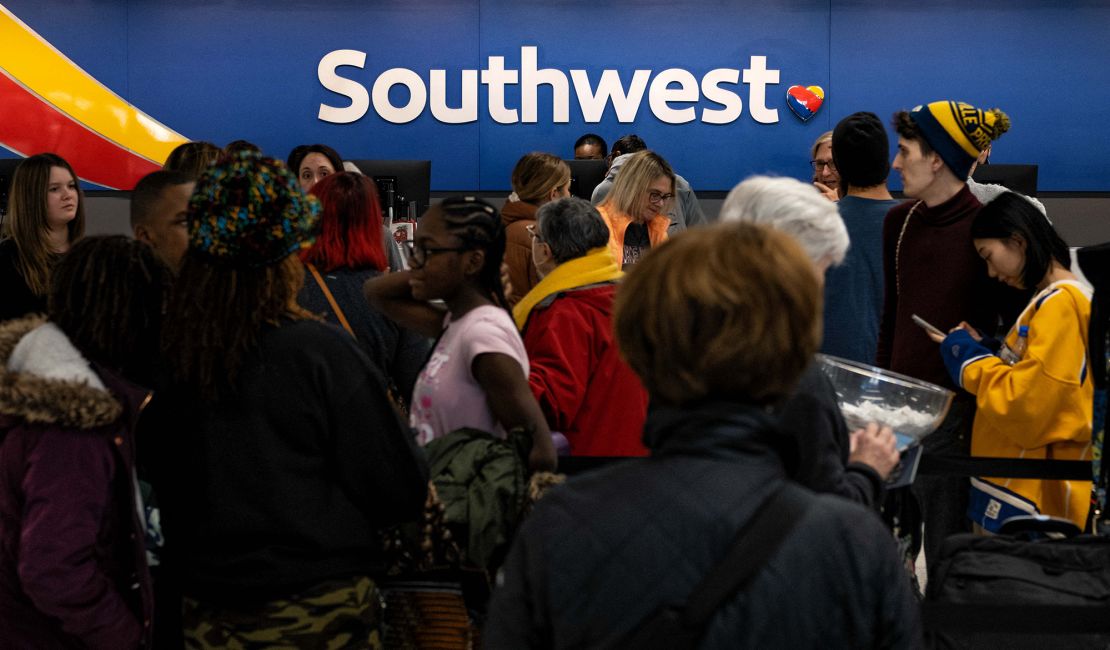A version of this story appeared in CNN Business’ Nightcap newsletter. To get it in your inbox, sign up for free, here.
It’s a familiar tale in the aviation industry: A black swan event hits all airlines, causing massive flight cancellations. But, as many begin to recover, one airline emerges as a problem, unable to get it together — to the detriment of its customers and employees.
It happened to Southwest during peak holiday travel time in December 2022 when severe winter storms forced airlines to cancel droves of flights. But, as the weather improved, thousands of Southwest planes remained grounded for an infamous 10 days even as just about every other airline was operating without major disruptions.
That debacle, a product of antiquated scheduling technology that made it more difficult for the airline to adjust its flight schedule and to have crews available to fly the rescheduled flights, cost the company close to $1 billion.
Now, in the wake of the CrowdStrike outage that began affecting major airlines on Friday, many across the globe that were initially prevented from flying had recovered and resumed normal operations by the end of the weekend. Not so for Delta Air Lines.
The Atlanta-based airline and its regional carrier (which feeds its system under the Delta Connection brand) collectively canceled more than 7,000 flights over four days. The situation finally appeared to be returning to normal Wednesday: Delta canceled only 51 flights, according to tracking service FlightAware, or only about 1% of its schedule.
But it could still take days to get all Delta passengers who had been booked on those canceled flights to where they wanted to go. The Department of Transportation, which is investigating the meltdown caused by Friday’s computer problems, estimated that more than half a million passengers were affected by the service meltdown.
Delta CEO Ed Bastian said in an early morning statement that the company expects Wednesday cancellations to be “minimal” and for Thursday to be “a normal day, with the airline fully recovered and operating at a traditional level of reliability.”
Bastian said that in addition to reimbursements for affected passengers’ meals, hotel accommodations and ground transportation, those impacted by the service problems will receive frequent flyer miles and travel vouchers “as a further gesture of apology.” But the amount of those miles and vouchers was not specified.
Why hasn’t Delta already gotten back to business as usual? Internal scheduling system issues, which are impacting the airline’s ability to communicate with crew about everyone’s whereabouts.
Frustrated customers were left wondering: Did Delta not learn anything from Southwest?

Reboots are never easy for airlines
When any piece of technology I own has a glitch, my instinct is to turn it off and back on again. That simple act tends to solve almost all the issues we have.
But for airlines, the system reboot that has to take place to coordinate new flights is not remotely simple, Kathleen Bangs, a FlightAware spokesperson, told CNN.
The greater the number of flight disruptions, the harder the reset, because it means more crew members are flooding the internal system at the same time to square away their next flights.
And it just so happened to be that the past weekend was the busiest travel weekend of the summer, Delta CEO Ed Bastian said in a recent note.
Southwest’s meltdown also occurred during a peak travel period, days ahead of Christmas.
But it’s not like Delta executives were sitting on the sidelines during Southwest’s struggles thinking, “’Well we really are an amazing airline. Look at us coasting while they fall apart,’” Bangs said. “Every airline was probably checking their systems and looking at improvements they could make to their own IT.”
Southwest was at a unique disadvantage in 2022 because of how outdated its tech was. Crew members voiced their concerns about it well before the meltdown, but were largely ignored. Now, that airline is taking a victory lap after its operations over the weekend were virtually unaffected.

“We’ve been consistently investing across the airline to modernize our core operation technology, bringing redundancies that helped us navigate around some vendors’ temporary issues,” Chris Perry, a Southwest spokesperson, told CNN.
In the case of Delta, Bangs said she’d be surprised to learn that its current situation is being exacerbated by outdated technology. But it remains a mystery as to why Delta’s system is faring so much worse than its competitors. (The airline declined to respond to CNN’s inquiry, instead directing it to recent company statements.)
Meanwhile, Delta’s competitors aren’t shying away from throwing shade.
“Folks, if you could please take your seat so we can keep the line moving. We want to get you out of here on time, unlike Delta!” one Reddit user reported a flight attendant announced on a non-Delta flight on Tuesday.
Bangs’ advice to them: “Be very careful, because it could be your turn in the barrel next.”








